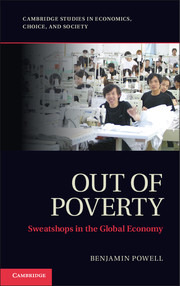Book contents
- Frontmatter
- Contents
- Figures
- Tables
- Acknowledgments
- Preface
- 1 Introduction
- 2 The Anti-Sweatshop Movement
- 3 The Economics of Sweatshop Wage Determination
- 4 Don’t Cry for Me, Kathie Lee
- 5 Health, Safety, and Working Conditions Laws
- 6 Save the Children?
- 7 Is It Ethical to Buy Sweatshop Products?
- 8 A History of Sweatshops, 1780–2010
- 9 The Process of Economic Development
- 10 What Good Can Activists Do?
- 11 Conclusion
- References
- About the Author
- Index
- References
3 - The Economics of Sweatshop Wage Determination
Published online by Cambridge University Press: 05 June 2014
- Frontmatter
- Contents
- Figures
- Tables
- Acknowledgments
- Preface
- 1 Introduction
- 2 The Anti-Sweatshop Movement
- 3 The Economics of Sweatshop Wage Determination
- 4 Don’t Cry for Me, Kathie Lee
- 5 Health, Safety, and Working Conditions Laws
- 6 Save the Children?
- 7 Is It Ethical to Buy Sweatshop Products?
- 8 A History of Sweatshops, 1780–2010
- 9 The Process of Economic Development
- 10 What Good Can Activists Do?
- 11 Conclusion
- References
- About the Author
- Index
- References
Summary
Critics point out working conditions in sweatshops that any citizen in the developed world would find deplorable. The anti-sweatshop movement suggests many laws, regulations, and consumer activist tactics in the hope of improving the lives of sweatshop workers. Sentiments such as those expressed by Sheri Davis, a graduate student at Ohio State University and participant at a USAS rally, are common: “Everybody wants to have a living wage. Everybody wants to be able to take care of themselves and their family. Everybody wants to retire and feel good, enjoy life. Breathe. Live. Eat. You know, the regular shit. We’re not asking for nothing extra special.” Unfortunately, wishing does not make it so.
Each law, regulation, or activist activity impacts the incentives of companies that hire sweatshop workers. Some of these actions may help sweatshop workers. Unfortunately, others will have unintended secondary consequences that impact employer incentives and, as a result, leave already poor sweatshop workers even worse off. Activists need to understand the market forces that determine wages to understand which policies can help workers and which will hurt them.
- Type
- Chapter
- Information
- Out of PovertySweatshops in the Global Economy, pp. 23 - 47Publisher: Cambridge University PressPrint publication year: 2014



